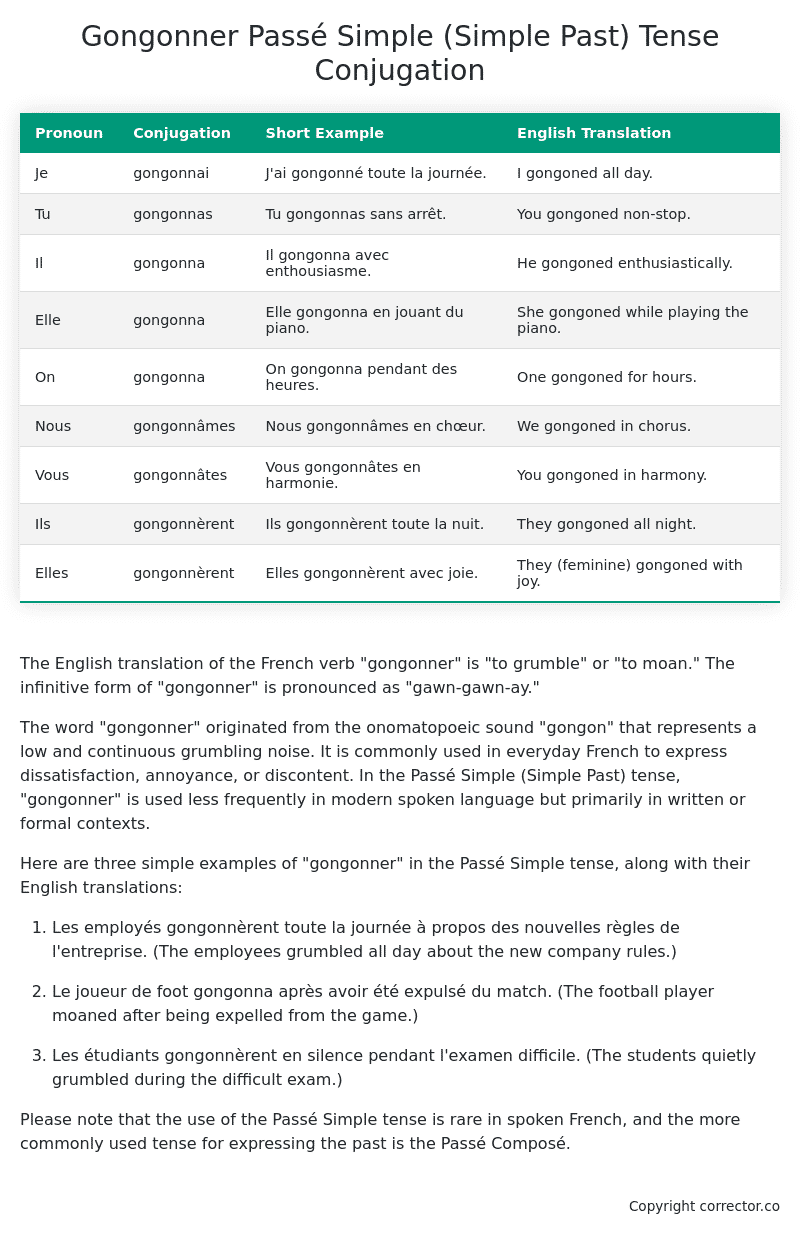Passé Simple (Simple Past) Tense Conjugation of the French Verb gongonner
Introduction to the verb gongonner
The English translation of the French verb “gongonner” is “to grumble” or “to moan.” The infinitive form of “gongonner” is pronounced as “gawn-gawn-ay.”
The word “gongonner” originated from the onomatopoeic sound “gongon” that represents a low and continuous grumbling noise. It is commonly used in everyday French to express dissatisfaction, annoyance, or discontent. In the Passé Simple (Simple Past) tense, “gongonner” is used less frequently in modern spoken language but primarily in written or formal contexts.
Here are three simple examples of “gongonner” in the Passé Simple tense, along with their English translations:
-
Les employés gongonnèrent toute la journée à propos des nouvelles règles de l’entreprise.
(The employees grumbled all day about the new company rules.) -
Le joueur de foot gongonna après avoir été expulsé du match.
(The football player moaned after being expelled from the game.) -
Les étudiants gongonnèrent en silence pendant l’examen difficile.
(The students quietly grumbled during the difficult exam.)
Please note that the use of the Passé Simple tense is rare in spoken French, and the more commonly used tense for expressing the past is the Passé Composé.
Table of the Passé Simple (Simple Past) Tense Conjugation of gongonner
| Pronoun | Conjugation | Short Example | English Translation |
|---|---|---|---|
| Je | gongonnai | J’ai gongonné toute la journée. | I gongoned all day. |
| Tu | gongonnas | Tu gongonnas sans arrêt. | You gongoned non-stop. |
| Il | gongonna | Il gongonna avec enthousiasme. | He gongoned enthusiastically. |
| Elle | gongonna | Elle gongonna en jouant du piano. | She gongoned while playing the piano. |
| On | gongonna | On gongonna pendant des heures. | One gongoned for hours. |
| Nous | gongonnâmes | Nous gongonnâmes en chœur. | We gongoned in chorus. |
| Vous | gongonnâtes | Vous gongonnâtes en harmonie. | You gongoned in harmony. |
| Ils | gongonnèrent | Ils gongonnèrent toute la nuit. | They gongoned all night. |
| Elles | gongonnèrent | Elles gongonnèrent avec joie. | They (feminine) gongoned with joy. |
Other Conjugations for Gongonner.
Le Present (Present Tense) Conjugation of the French Verb gongonner
Imparfait (Imperfect) Tense Conjugation of the French Verb gongonner
Passé Simple (Simple Past) Tense Conjugation of the French Verb gongonner (You’re reading it right now!)
Passé Composé (Present Perfect) Tense Conjugation of the French Verb gongonner
Futur Simple (Simple Future) Tense Conjugation of the French Verb gongonner
Futur Proche (Near Future) Tense Conjugation of the French Verb gongonner
Plus-que-parfait (Pluperfect) Tense Conjugation of the French Verb gongonner
Passé Antérieur (Past Anterior) Tense Conjugation of the French Verb gongonner
Futur Antérieur (Future Anterior) Tense Conjugation of the French Verb gongonner
Subjonctif Présent (Subjunctive Present) Tense Conjugation of the French Verb gongonner
Subjonctif Passé (Subjunctive Past) Tense Conjugation of the French Verb gongonner
Subjonctif Imparfait (Subjunctive Imperfect) Tense Conjugation of the French Verb gongonner
Subjonctif Plus-que-parfait (Subjunctive Pluperfect) Tense Conjugation of the French Verb gongonner
Conditionnel Présent (Conditional Present) Tense Conjugation of the French Verb gongonner
Conditionnel Passé (Conditional Past) Tense Conjugation of the French Verb gongonner
Conditionnel Passé II (Conditional Past II) Tense Conjugation of the French Verb gongonner
L’impératif Présent (Imperative Present) Tense Conjugation of the French Verb gongonner
L’impératif Passé (Imperative Past) Tense Conjugation of the French Verb gongonner
L’infinitif Présent (Infinitive Present) Tense Conjugation of the French Verb gongonner
L’infinitif Passé (Infinitive Past) Tense Conjugation of the French Verb gongonner
Le Participe Présent (Present Participle) Tense Conjugation of the French Verb gongonner
Le Participe Passé (Past Participle) Tense Conjugation of the French Verb gongonner
Struggling with French verbs or the language in general? Why not use our free French Grammar Checker – no registration required!
Get a FREE Download Study Sheet of this Conjugation 🔥
Simply right click the image below, click “save image” and get your free reference for the gongonner Passé Simple tense conjugation!

Gongonner – About the French Passé Simple (Simple Past) Tense
Formation
Usage
Narration
Historical Context
Interactions with other tenses
Passé Composé
Imparfait
Conditional and Subjunctive
Summary
I hope you enjoyed this article on the verb gongonner. Still in a learning mood? Check out another TOTALLY random French verb conjugation!


